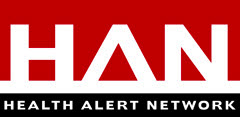
Thursday, December 14, 2006, 20:10 EST (08:10 PM EST)
CDCHAN-00256-2006-12-14-UPD-N
Corrected: Multistate Outbreak of E. coli 0157 Infections, November-December 2006
This message is being sent to correct the information within CDC Health Update (CDCHAN-00255-06-12-14-UPD-N).
As of 12:00 PM (EST) Wednesday, December 13, 2006, 71 persons with illness associated with the Taco Bell restaurant E. coli 0157 outbreak have been reported to CDC from 5 states: New Jersey (33), New York (22), Pennsylvania (13), Delaware (2), and South Carolina (1). States with Taco Bell restaurants where persons confirmed to have the outbreak strain have eaten are New Jersey, New York, Pennsylvania, and Delaware. (The patient from South Carolina ate at a Taco Bell restaurant in Pennsylvania). Other cases of illness are under investigation by state public health officials. Among these 71 ill persons, 53 (75%) were hospitalized and 8 (11%) developed a type of kidney failure called hemolytic-uremic syndrome (HUS). Illness onset dates have ranged from November 20 to December 6. The number of cases peaked in the last week of November. No illnesses were reported with onset within the past week, so the outbreak is over.
Cases in 48 of the 71 patients are confirmed, meaning that the patients E. coli O157 strains have the outbreak DNA fingerprint. E. coli O157 strains are routinely DNA fingerprinted at public health laboratories in all states as part of PulseNet (the network of public health laboratories that sub-type bacteria). E. coli O157 strains from other cases are being tested by PulseNet. As a result of testing by PulseNet, cases with the outbreak strain fingerprint pattern are being re-classified as confirmed cases, and cases with an unrelated fingerprint pattern are being dropped from the outbreak case count.
CDC is working with state and local health officials, the Food and Drug Administration (FDA), the Department of Agriculture (USDA), and the restaurant chain to determine what food caused the outbreak. Public health investigators have identified a few ingredients that were consumed more often by ill persons than well persons and were statistically linked with illness: lettuce, cheddar cheese, and ground beef. This analysis also indicates that onions of any type are not linked to this outbreak. Evaluation of additional information about the locations of involved restaurants, the patterns of distribution of food ingredients, and the characteristics and preparation of food ingredients indicates that shredded lettuce consumed at Taco Bell restaurants in the northeastern United States was the most likely source of the outbreak. Because multiple Taco Bell restaurants were involved during the same time period, contamination of lettuce likely occurred before reaching the restaurants. Health officials and the restaurant chain are working collaboratively to learn more about the shredded lettuce to determine how it may have become contaminated.
Health officials in Minnesota and Iowa are investigating a separate outbreak of E. coli O157 infections associated with another fast food restaurant chain. They are reporting 27 and 50 associated illnesses, respectively. E. coli O157 strains isolated from patients in both states have indistinguishable DNA fingerprint patterns, confirming that the Iowa and Minnesota clusters are linked. This pattern is distinct from the Taco Bell restaurant outbreak pattern. A strain that matches that of patients in this new outbreak has also been isolated from an ill person in Wisconsin. Investigators in Minnesota and Iowa have independently identified lettuce as the contaminated food vehicle. Traceback efforts are underway. The most recent onset of illness from a confirmed case in this outbreak is December 8, and this outbreak is not considered over.
E. coli O157 causes diarrhea that is often bloody and accompanied by severe abdominal cramps, but fever is typically absent or mild. Persons who have developed such symptoms are advised to consult a physician to request that a stool sample be tested for E. coli, and to inform their local health department.
For more information on E. coli infection and this outbreak, please refer to the following website: http://www.cdc.gov/ecoli/
HAN Message Types
- Health Alert: Conveys the highest level of importance; warrants immediate action or attention. Example: HAN00001
- Health Advisory: Provides important information for a specific incident or situation; may not require immediate action. Example: HAN00316
- Health Update: Provides updated information regarding an incident or situation; unlikely to require immediate action. Example: HAN00309
- Info Service: Provides general information that is not necessarily considered to be of an emergent nature. Example: HAN00319
## This Message was distributed to State and Local Health Officers, Public Information Officers, Epidemiologists and HAN Coordinators as well as Clinician organizations ##
You have received this message based upon the information contained within our emergency notification database. If you have a different or additional e-mail or fax address that you would like us to use, please contact your State-based Health Alert Network program at your State or local health department.
- Content source: CDC Emergency Risk Communication Branch (ERCB), Division of Emergency Operations (DEO), Office of Public Health Preparedness and Response (OPHPR)
Get email updates
To receive email updates about this page, enter your email address:
Contact Us:
- Centers for Disease Control and Prevention
1600 Clifton Rd
Atlanta, GA 30333 - 800-CDC-INFO
(800-232-4636)
TTY: (888) 232-6348 - Contact CDC-INFO


